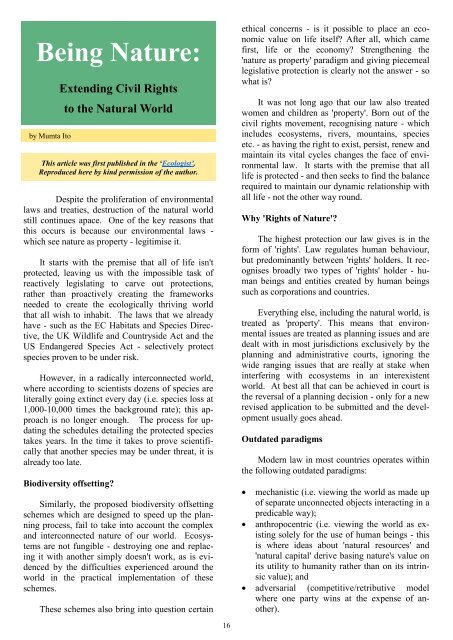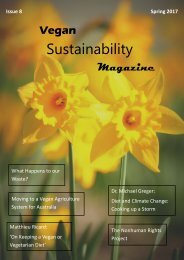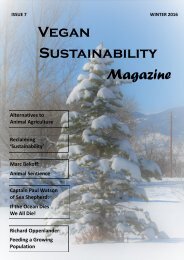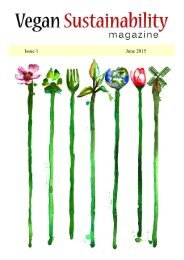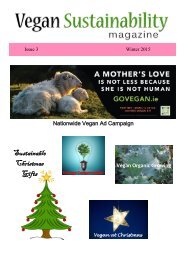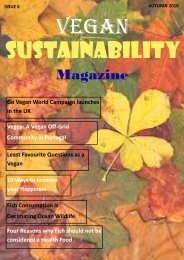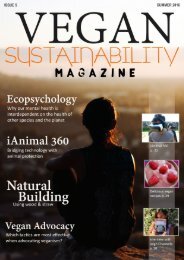Vegan Sustainability Magazine - Autumn 2015
A free, online, quarterly magazine for vegans and non-vegans worldwide who are interested in the environment and sustainability.
A free, online, quarterly magazine for vegans and non-vegans worldwide who are interested in the environment and sustainability.
You also want an ePaper? Increase the reach of your titles
YUMPU automatically turns print PDFs into web optimized ePapers that Google loves.
Being Nature:<br />
by Mumta Ito<br />
Extending Civil Rights<br />
to the Natural World<br />
This article was first published in the ‘Ecologist’.<br />
Reproduced here by kind permission of the author.<br />
Despite the proliferation of environmental<br />
laws and treaties, destruction of the natural world<br />
still continues apace. One of the key reasons that<br />
this occurs is because our environmental laws -<br />
which see nature as property - legitimise it.<br />
It starts with the premise that all of life isn't<br />
protected, leaving us with the impossible task of<br />
reactively legislating to carve out protections,<br />
rather than proactively creating the frameworks<br />
needed to create the ecologically thriving world<br />
that all wish to inhabit. The laws that we already<br />
have - such as the EC Habitats and Species Directive,<br />
the UK Wildlife and Countryside Act and the<br />
US Endangered Species Act - selectively protect<br />
species proven to be under risk.<br />
However, in a radically interconnected world,<br />
where according to scientists dozens of species are<br />
literally going extinct every day (i.e. species loss at<br />
1,000-10,000 times the background rate); this approach<br />
is no longer enough. The process for updating<br />
the schedules detailing the protected species<br />
takes years. In the time it takes to prove scientifically<br />
that another species may be under threat, it is<br />
already too late.<br />
Biodiversity offsetting?<br />
Similarly, the proposed biodiversity offsetting<br />
schemes which are designed to speed up the planning<br />
process, fail to take into account the complex<br />
and interconnected nature of our world. Ecosystems<br />
are not fungible - destroying one and replacing<br />
it with another simply doesn't work, as is evidenced<br />
by the difficulties experienced around the<br />
world in the practical implementation of these<br />
schemes.<br />
These schemes also bring into question certain<br />
ethical concerns - is it possible to place an economic<br />
value on life itself? After all, which came<br />
first, life or the economy? Strengthening the<br />
'nature as property' paradigm and giving piecemeal<br />
legislative protection is clearly not the answer - so<br />
what is?<br />
It was not long ago that our law also treated<br />
women and children as 'property'. Born out of the<br />
civil rights movement, recognising nature - which<br />
includes ecosystems, rivers, mountains, species<br />
etc. - as having the right to exist, persist, renew and<br />
maintain its vital cycles changes the face of environmental<br />
law. It starts with the premise that all<br />
life is protected - and then seeks to find the balance<br />
required to maintain our dynamic relationship with<br />
all life - not the other way round.<br />
Why 'Rights of Nature'?<br />
The highest protection our law gives is in the<br />
form of 'rights'. Law regulates human behaviour,<br />
but predominantly between 'rights' holders. It recognises<br />
broadly two types of 'rights' holder - human<br />
beings and entities created by human beings<br />
such as corporations and countries.<br />
Everything else, including the natural world, is<br />
treated as 'property'. This means that environmental<br />
issues are treated as planning issues and are<br />
dealt with in most jurisdictions exclusively by the<br />
planning and administrative courts, ignoring the<br />
wide ranging issues that are really at stake when<br />
interfering with ecosystems in an interexistent<br />
world. At best all that can be achieved in court is<br />
the reversal of a planning decision - only for a new<br />
revised application to be submitted and the development<br />
usually goes ahead.<br />
Outdated paradigms<br />
Modern law in most countries operates within<br />
the following outdated paradigms:<br />
<br />
<br />
mechanistic (i.e. viewing the world as made up<br />
of separate unconnected objects interacting in a<br />
predicable way);<br />
anthropocentric (i.e. viewing the world as existing<br />
solely for the use of human beings - this<br />
is where ideas about 'natural resources' and<br />
'natural capital' derive basing nature's value on<br />
its utility to humanity rather than on its intrinsic<br />
value); and<br />
adversarial (competitive/retributive model<br />
where one party wins at the expense of another).<br />
16


